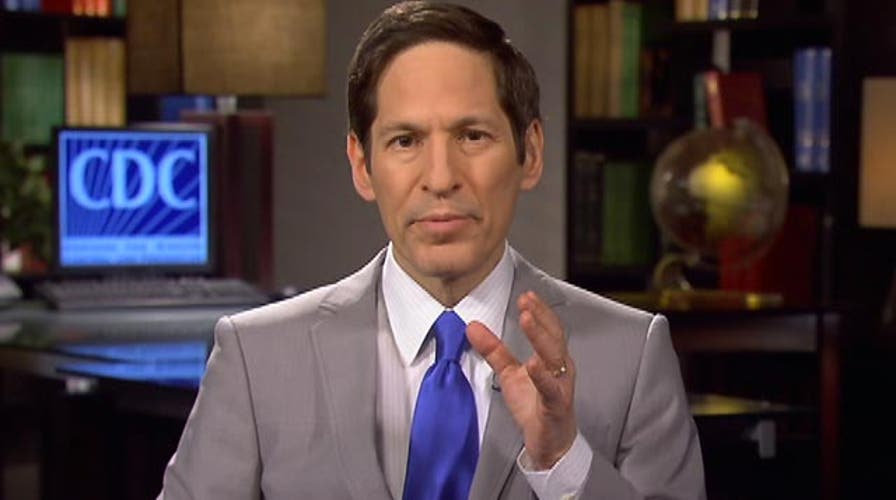How can the Ebola outbreak be contained in Africa?
CDC Director Tom Frieden on the strategy to contain the deadly virus
CDC disease detective Kelsey Mirkovic, just back from West Africa, tells of working to gain the confidence of village leaders and train community health workers to spread the word about how to avoid getting – and stop spreading – Ebola. “The community health workers are key in the effort to stop Ebola because they are working with people in their villages every day. But if they meet with resistance, it’s the village chief who can make the difference. “
An encounter in one village, resolved with the help of the chief, taught Kelsey valuable lessons in how to reach people and communicate more effectively. A grateful chief presented Kelsey with a symbolic gift of cocoa pods and a coffee plant. For her, the gift symbolized the important connection made and confidence gained with a trusted community leader.
Kelsey and her colleagues are fulfilling our promise to the people of West Africa, Americans, and the world that CDC is quickly ramping up its efforts to help bring the worst Ebola outbreak in history under control.
[pullquote]
CDC has deployed a rotating group of more than 60 staff members to Guinea, Sierra Leone, Liberia, and Nigeria to fight Ebola’s spread. And hundreds more support the effort here at home.
I’ve asked all CDC staff to consider the contributions they can make to helping stop Ebola. Now I’m headed to Africa, too. I want to hear directly from people there what can be done better and faster, and see what more I can do to support the critical work going on at the front lines of the fight to stop the disease.
We must quickly identify the ongoing needs and determine how to leverage additional help as soon as possible to fight the outbreak at the source. We want to do everything in our power to help stop this outbreak. We will protect people around the world, including in the United States, by stopping Ebola at its source.
I’m so proud of CDC staff, including our Epidemic Intelligence Service (EIS) officers, who serve as the world’s first line of defense – our boots on the ground – to prevent, detect, and respond to disease outbreaks. These disease detectives are essential to improve global health security and keep Americans safe and healthy. They are public health heroes.
CDC can’t be everywhere. That’s why we focus on helping countries develop their own cadres of public health workers who can apply the core principles of public health: find the disease, isolate patients, trace and monitor any contacts, and stop the exposures.
EIS is a global model for training in applied epidemiology. Since the 1980s, we’ve helped 40 other countries develop similar training through our Field Epidemiology Training Program (FETP). Trainees and graduates of these programs find and stop hundreds of outbreaks a year, usually without CDC’s direct involvement, which is exactly the type of self-sufficient sustainability the program is intended to foster. In April, two current FETP associates and one graduate from FETP-Kenya went to Liberia to assist in the response to the West Africa Ebola outbreak.
I hope to help generate the will and resources to expand FETP training to all of West Africa, something the CDC Foundation has already received $2.5 million from the World Bank to start.
But countries need resources to stop an outbreak. They need an emergency operations center, a nation-wide laboratory system, and real-time information systems.
Last year I visited Uganda, where we have a demonstration project underway to build that specific infrastructure. The progress of this project was deeply impressive, and will always stay with me as one of the highest impact initiatives CDC has undertaken in my time as director.
Within a year, the Ugandans were able to establish a laboratory network for deadly diseases – including Ebola – covering most of the country, improve emergency operations, and greatly improve their ability to respond quickly to new and emerging disease threats.
The Ebola outbreak in West Africa is a tragic and painful reminder that global health security has a direct impact on the health of all of us here in the United States. Infectious diseases do not recognize borders. Uncontrolled disease anywhere is potentially a threat everywhere.
Improving global health security will protect Americans while boosting our international partnerships and increasing political and economic stability overseas.
The U.S. government’s Global Health Security Agenda was created to strengthen our national security by partnering with other nations to prevent, rapidly detect, and effectively respond to disease outbreaks. Over the next five years, the initiative will strengthen the health infrastructures of at least 30 partner countries with 4 billion people. CDC has requested an additional $45 million in next year’s federal budget to further expand this vital initiative.
When we invest the time and resources to help other countries protect their own people, we help protect Americans, too.
We can stop Ebola with traditional public health measures, although it won’t be easy and it won’t be immediate.
But working together with our U.S. and international partners and country leadership, we are fully engaged in the fight to do it, and to help develop the people, labs, and response systems that will prevent the next outbreak of Ebola or any other health threat.

